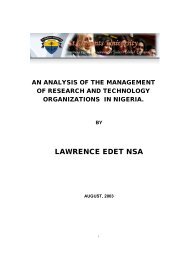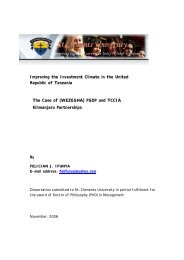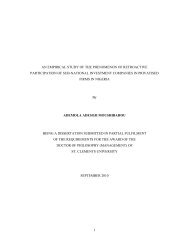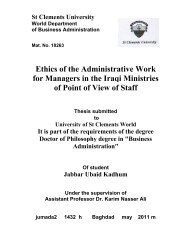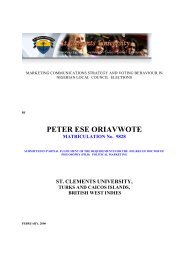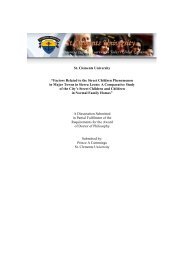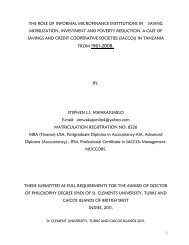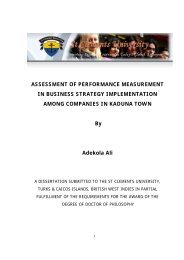CHURCH AWARENESS AND PRACTICE OF TOTAL QUALITY ...
CHURCH AWARENESS AND PRACTICE OF TOTAL QUALITY ...
CHURCH AWARENESS AND PRACTICE OF TOTAL QUALITY ...
You also want an ePaper? Increase the reach of your titles
YUMPU automatically turns print PDFs into web optimized ePapers that Google loves.
number six as shown below which management may not have the capacity to foresee or<br />
to thwart.<br />
1. Top management sees no reasons for change because current<br />
market situation is good enough.<br />
2. Top management is not concerned for staff or future of the organization.<br />
3. Top management implements TQM only because others are doing so.<br />
4. Top management loses interest mid-way and abandons it.<br />
5. Top management cannot see eye-to-eye on what TQM is all about.<br />
6. Sudden sales decline mid-way into TQM.<br />
7. Top management imposes TQM on an unwilling workforce.<br />
8. Top management sets no performance targets from beginning, so no measurement of<br />
success can be done.<br />
9. Top management has not analyzed processes very well for<br />
effectiveness.<br />
Besterfield et al (1995, P2) see TQM as requiring six basic concepts. The first of the six<br />
and the most essential is “a committed and involved management to provide long-term<br />
top-to-bottom organizational support.” The issue of “involved” brought in here adds a<br />
new positive dimension. It is possible for top management to be committed to TQM and<br />
not be physically involved.<br />
A top manager can decide to give TQM a go-head, fund it well and simply call into the<br />
organization TQM experts or assign the responsibility to a manager without his personal<br />
involvement from time to time. Commitment alone is not enough; personal involvement<br />
of top management is not negotiable.<br />
Besterfield also mentioned something very significant - “… long-term…” This explains<br />
the futuristic aspects of TQM. Agreed that the concept may not produce immediately<br />
because the fruits usually become realizable years after its implementation as the<br />
Japanese have experienced. But the term “to provide long-term… organizational support”<br />
connotes that there is an anticipated ending to management commitment some day. This<br />
is not in agreement with the tenets of TQM of an unending practice, commitment and<br />
involvement.<br />
Once a Church organization adopts TQM, it should be an un-ending practice and<br />
commitment. This should pass on from generation to generation. Leadership successors<br />
should be developed to carry on the TQM tradition which must have been built over<br />
years. That was what Jesus did by appointing the twelve disciples headed by Simon Peter<br />
who went ahead with the work after He left.<br />
2.1:3 Customer Focus and Satisfaction: While customer focus is the turning of an<br />
organization’s major focus on the customer through behavioral and culture change,<br />
satisfying the customer is by turning that focus into an understanding of the customer<br />
requirements and needs.



